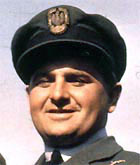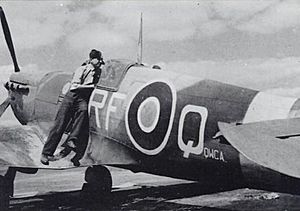Antoni Głowacki facts for kids
Quick facts for kids
Antoni Głowacki
|
|
|---|---|

Antoni Głowacki c. 1945
|
|
| Birth name | Antoni Głowacki |
| Nickname(s) | Antek (Polish nickname) Toni (RAF nickname) |
| Born | 10 February 1910 Warsaw, Poland |
| Died | 27 April 1980 (aged 70) Wellington, New Zealand |
| Allegiance | |
| Service/ |
|
| Years of service | 1935–1945 1946–1960 |
| Rank | Wing Commander |
| Service number | P-1527 |
| Unit | No. 501 Squadron RAF No. 303 Polish Fighter Squadron |
| Commands held | No. 309 "Land of Czerwień" Polish Fighter-Reconnaissance Squadron No. 302 Polish Fighter Squadron |
| Battles/wars | Second World War
|
| Awards | Distinguished Flying Cross Distinguished Flying Medal |
| Other work | New Zealand Department of Civil Aviation Airfield Inspector |
Antoni (Toni) Głowacki (born February 10, 1910 – died April 27, 1980) was a brave Polish fighter pilot. He flew planes during World War II. Antoni was part of Polish squadrons that helped the Royal Air Force (RAF). He became famous for a special achievement. On August 24, 1940, during the Battle of Britain, he shot down five German planes in one day! This made him an "ace-in-a-day." Only three other pilots achieved this during that battle.
Contents
Becoming a Pilot
Antoni Głowacki was born in Warsaw, Poland, on February 10, 1910. He went to school there and studied radio engineering. Later, he worked as a lab head at a Philips factory in Poland.
In 1935, Antoni joined the military and started air training. He became an officer in the Polish Air Force. By 1938, he was a flying instructor. He taught new pilots at a training center in Dęblin. This was important because the Polish Air Force needed many new recruits.
Fighting in World War II
When Germany invaded Poland in September 1939, Antoni's unit could not fight back. He joined a reconnaissance group. When Poland's defense collapsed, Antoni escaped to Romania. Like many other Polish soldiers, he was held there.
He then traveled by sea to France. Soon, he was ordered to England. He was one of 100 pilots chosen to train as bomber pilots. But when he arrived in England in January 1940, the RAF needed fighter pilots. So, he was sent to fighter squadrons instead.
After more training, Antoni joined No. 501 Squadron RAF on August 5, 1940. He flew Hawker Hurricane planes.
The Battle of Britain
Antoni quickly joined the fight. On August 15, he flew his first combat missions. He shot down a German Ju 87 dive-bomber. Later that day, he destroyed a Dornier Do 215. His squadron flew four times that day, stopping German planes over Dover.
Antoni had a favorite plane, a Hurricane he called his "lucky Hurricane." On August 24, 1940, he flew this plane three times. He shot down three German Bf 109 fighters. He also destroyed two Junkers Ju 88 bombers over Ramsgate. This incredible day made him the first "One-day Ace" of the Battle of Britain.
A few days later, on August 28, Antoni shot down another Bf 109. On August 31, he attacked a group of Dornier Do 17 bombers. He claimed one bomber, but his plane was shot down over Gravesend. He was injured when his Hurricane crashed and burned. After recovering, he returned to duty. Antoni was promoted to Pilot Officer. In February 1941, he became a flying instructor. He taught combat tactics to other pilots.
Later War Efforts
In November 1941, Antoni joined No. 303 Polish Fighter Squadron. Here, he flew Supermarine Spitfires. In 1942, he had two "probables" (meaning he likely shot them down) over Dieppe. He also helped shoot down a Heinkel He 111 bomber.
In February 1943, Antoni became a flight commander in No. 308 Polish Fighter Squadron. He served there until February 1944. After a special exchange with the USAAF, he commanded No. 309 "Land of Czerwień" Polish Fighter-Reconnaissance Squadron. This squadron used powerful Mustang Mk III fighters. He also served in other squadrons until late 1945.
After the War
After the war, Antoni Głowacki became a liaison officer for the RAF. He later commanded No. 302 Polish Fighter Squadron. His final rank in the Royal Air Force was Squadron Leader. During the war, he was credited with eight victories. He also had one shared victory, three probable victories, and three damaged enemy planes.
After leaving the military, Antoni moved to New Zealand. He joined the Royal New Zealand Air Force. As a Flight Lieutenant, he taught new pilots how to fly jet planes. He retired from the Air Force in 1960. Then, he worked as an airfield inspector for the New Zealand government. He was in charge of planes used for sports and business. Antoni Głowacki passed away on April 27, 1980, in Wellington, New Zealand.
Honours and Tributes
Antoni Głowacki received several awards for his bravery and service:
 Distinguished Flying Medal
Distinguished Flying Medal Silver Cross of the Virtuti Militari (a very high Polish military honor)
Silver Cross of the Virtuti Militari (a very high Polish military honor)Cross of Valour (Poland) and three bars
 Distinguished Flying Cross (United Kingdom)
Distinguished Flying Cross (United Kingdom)
See Also
 | Jessica Watkins |
 | Robert Henry Lawrence Jr. |
 | Mae Jemison |
 | Sian Proctor |
 | Guion Bluford |


